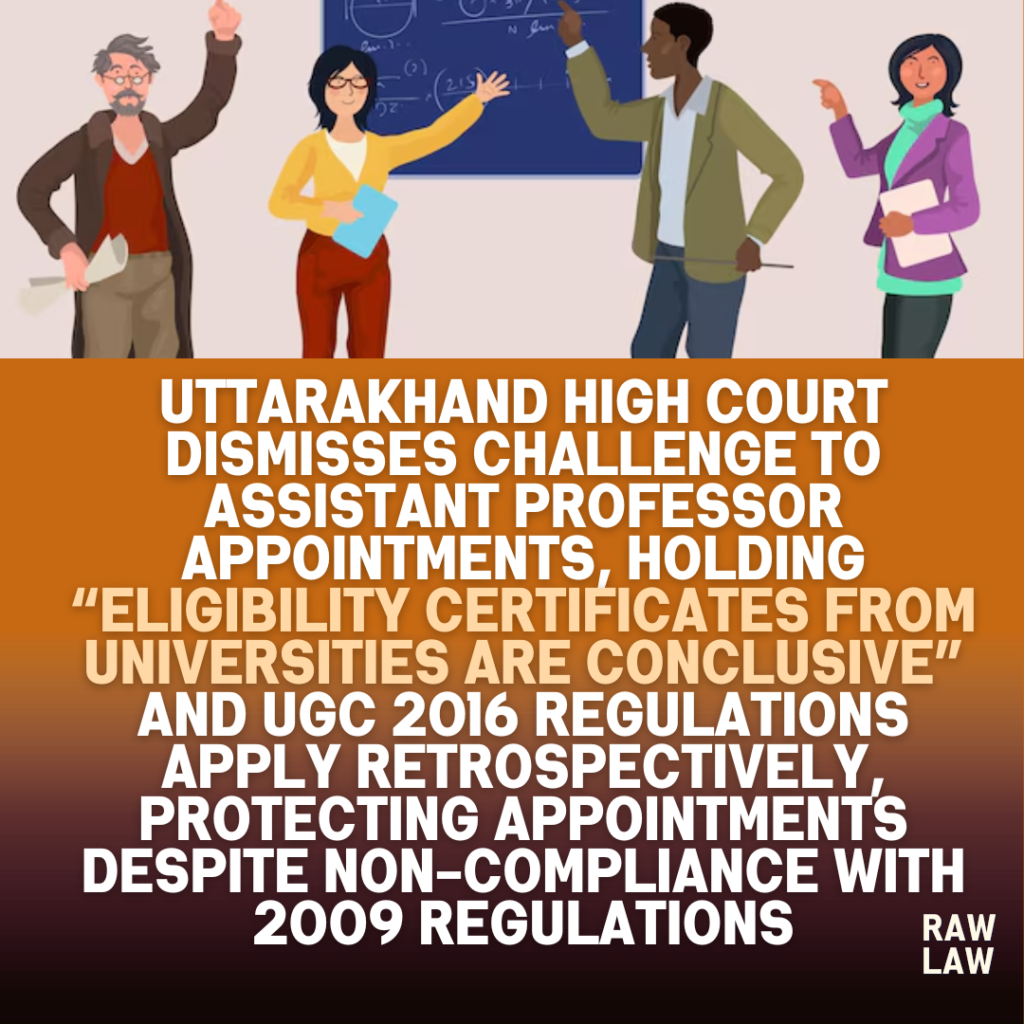Court’s Decision
The Uttarakhand High Court dismissed the writ petition seeking quashing of appointments of Assistant Professors in Gurukula Kangri Vishwavidyalaya, Haridwar, holding that candidates cannot be disqualified solely for not fulfilling the 2009 UGC Regulations if their Ph.D. degrees are certified under the 2016 UGC Regulations. The Court upheld the appointments after finding that the candidates possessed certificates from their universities certifying compliance with all five criteria under the 2016 Regulations, which were held applicable retrospectively by the Supreme Court in University of Kerala v. Marlin J.N.
Facts
The petitioner applied for Assistant Professor positions in Jyotirvigyan & Vedic Karmkand and Sanskrit at Gurukula Kangri Vishwavidyalaya following an advertisement in 2016. He appeared for interviews in November 2017 but was not selected, while the respondent candidates were appointed. The petitioner challenged the appointments on the grounds that the appointees did not qualify under the UGC Regulations, 2009, claiming their Ph.D. degrees were not in compliance, and that one respondent lacked NET qualification, making their selection illegal.
Issues
- Whether candidates appointed as Assistant Professors without compliance with the UGC Regulations, 2009, could be deemed ineligible for appointments.
- Whether certificates issued by universities under the UGC Regulations, 2016, certifying fulfilment of five conditions, could validate such appointments.
- Whether the UGC Regulations, 2016, apply retrospectively to protect appointments made despite non-compliance with 2009 Regulations.
Petitioner’s Arguments
The petitioner argued:
- The respondents did not comply with the UGC (Minimum Standards and Procedure for Award of M.Phil./Ph.D.) Regulations, 2009, rendering them ineligible for appointment as Assistant Professors.
- One respondent did not possess the NET qualification, which was mandatory under the applicable rules for the post.
- The Ph.D. degree of the appointees was not awarded in regular mode, as required under UGC regulations, and their appointment was contrary to law.
Respondent’s Arguments
The respondents, supported by the University, argued:
- The appointments were made following a fair and transparent selection process by a duly constituted committee with subject experts.
- There was no allegation of nepotism or favoritism in the selection process.
- The respondents had obtained certificates from Sampurnanand Sanskrit University certifying compliance with all five conditions of the UGC Regulations, 2016.
- The UGC Regulations, 2016, had retrospective application, and compliance with 2009 Regulations was not mandatory for appointments where such certification under 2016 Regulations was available.
Analysis of the Law
The Court analysed:
1. The UGC (Minimum Qualifications for Appointment of Teachers and Other Academic Staff in Universities and Colleges) Regulations, 2016, which allow exemption from NET/SLET/SET if a Ph.D. candidate fulfils five specified conditions and produces a certification from the awarding university.
2. Clause 4 of the University’s advertisement requiring NET unless exempted under the UGC Regulations.
3. The Supreme Court’s decision in University of Kerala v. Marlin J.N. holding that the 2016 Regulations apply retrospectively, thereby protecting appointments made despite non-compliance with the 2009 Regulations if the candidate meets the 2016 criteria.
Precedent Analysis
- University of Kerala v. Marlin J.N. (2022) 9 SCC 389: Held that UGC Regulations, 2016, apply retrospectively, validating appointments of Ph.D. holders without NET if they possess a certificate under the 2016 Regulations.
- The judgment clarifies that candidates cannot be denied appointments merely for non-compliance with the 2009 Regulations if they fulfil the 2016 requirements certified by their university.
Court’s Reasoning
The Court found:
- Respondent candidates possessed certificates from Sampurnanand Sanskrit University confirming compliance with the five conditions under the UGC Regulations, 2016.
- The certification under the 2016 Regulations was conclusive, and the Court could not go behind its correctness in the absence of any challenge to the validity of such certificates.
- Following the Supreme Court’s Marlin J.N. decision, the retrospective application of the 2016 Regulations validated the appointments even if the Ph.D. degrees were not in compliance with the 2009 Regulations.
- The selection process was conducted fairly by a duly constituted committee, with no allegations of bias or procedural irregularities.
Conclusion
- The Uttarakhand High Court dismissed the writ petition, upholding the appointments of the Assistant Professors.
- Held that certificates under the UGC Regulations, 2016, confirming compliance with the required conditions were sufficient for eligibility, even if the 2009 Regulations were not met.
- Clarified that the 2016 Regulations apply retrospectively and protect such appointments.
Implications
- Confirms that UGC Regulations, 2016, apply retrospectively and protect appointments made despite non-compliance with 2009 Regulations if certified under 2016 norms.
- Reinforces the limited scope of judicial review over academic appointments made through proper procedures by competent selection committees.
- Clarifies the importance of certification under the 2016 UGC Regulations in determining eligibility for Assistant Professor posts.
Short Note on Referred Case
The Supreme Court held that the UGC Regulations, 2016, have retrospective application, ensuring that candidates with Ph.D. degrees and proper certification fulfilling five specified conditions are eligible for appointment even if their degrees do not comply with the 2009 Regulations.
FAQs
- Does the UGC 2016 Regulation apply retrospectively to teacher appointments?
Yes, the Uttarakhand High Court reaffirmed that the 2016 UGC Regulations apply retrospectively, validating appointments where candidates have certificates fulfilling its conditions.
- Can NET be waived for Assistant Professor appointments under UGC Rules?
Yes, if a Ph.D. candidate has a university-issued certificate under the 2016 Regulations confirming fulfilment of five specified conditions, they are exempt from the NET requirement.
- What was the Uttarakhand High Court’s decision regarding the Assistant Professor appointment dispute?
The Court upheld the appointments, ruling that certification under the 2016 Regulations was sufficient for eligibility and that the 2016 Regulations apply retrospectively, protecting the appointments.
